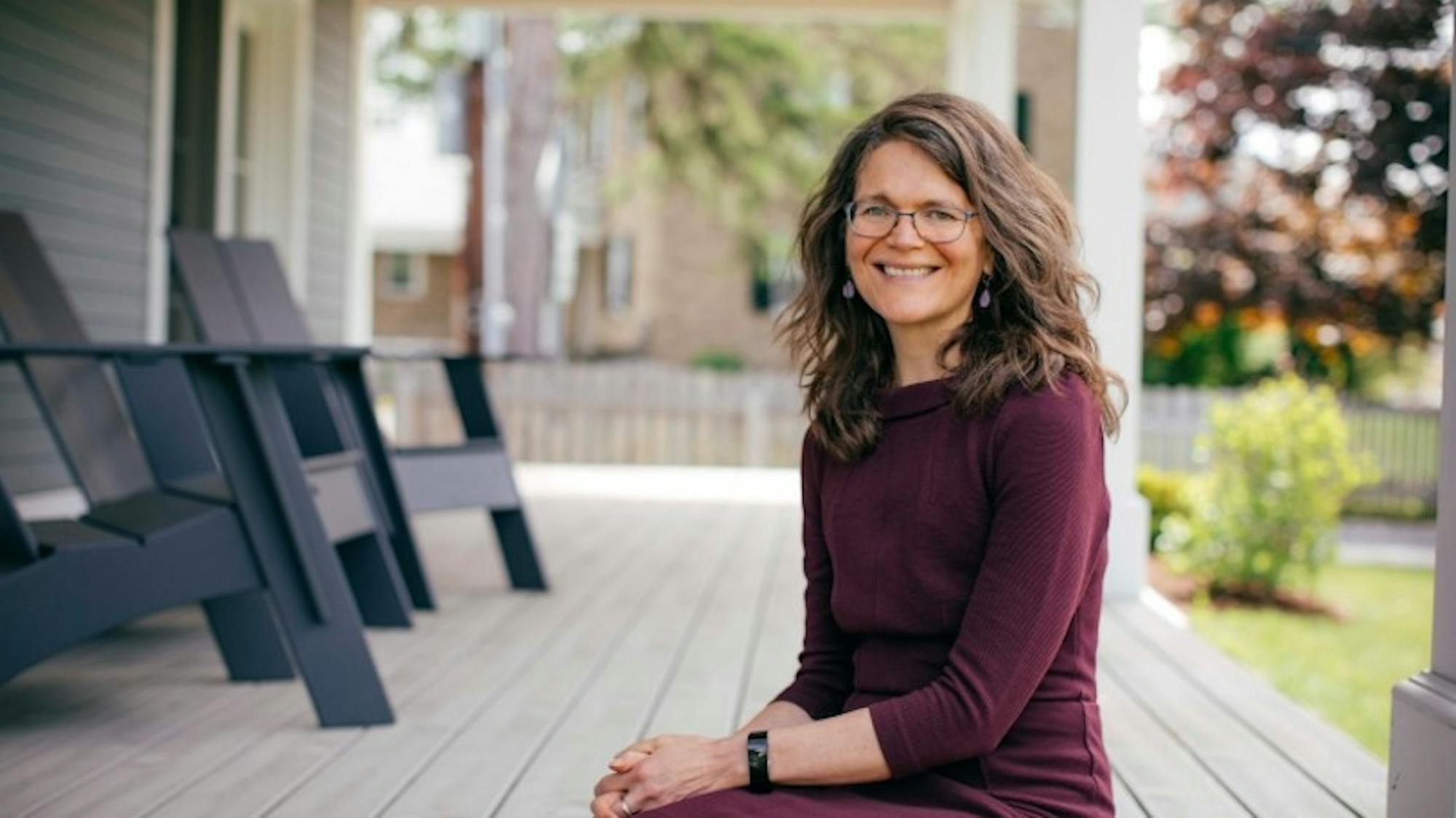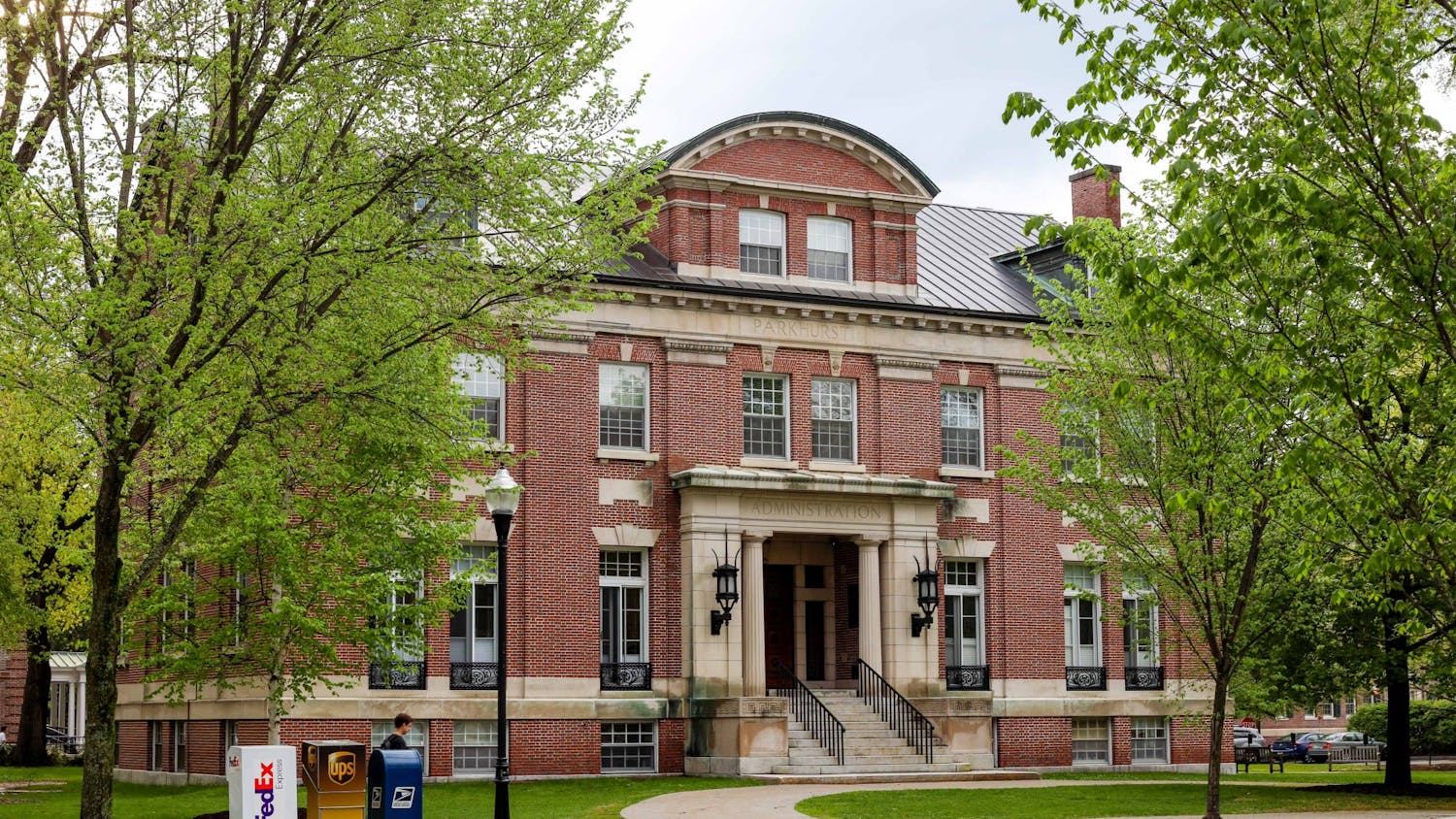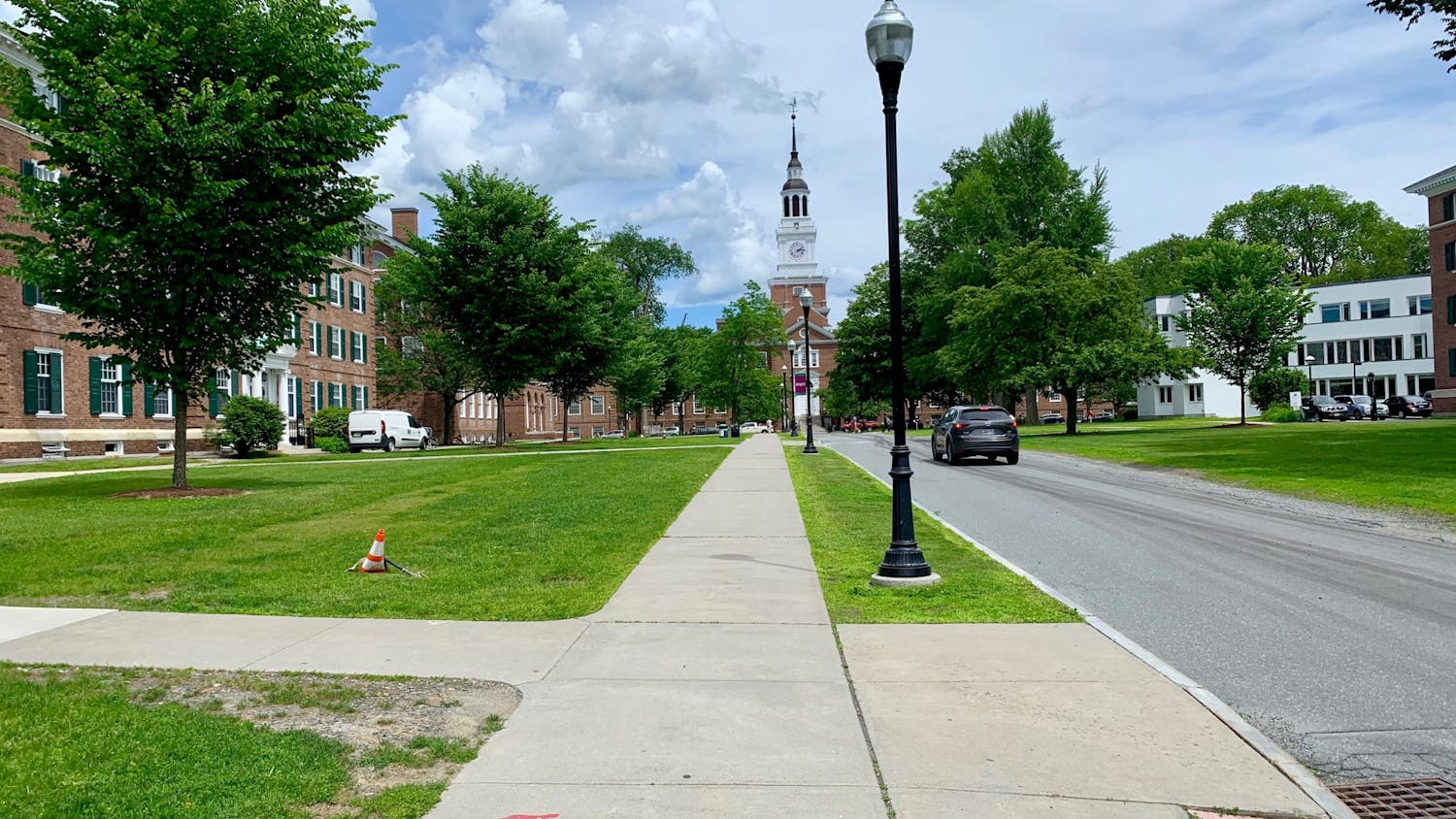This article is featured in the 2020 Freshman special issue.
Dean of the College Kathryn Lively has been the face of College communications to students about academic plans for the fall and other pandemic-related policies. She is known in part among students as the administrator whose campus emails have compared the flow of time to “cold maple syrup” and imparted the memorable words of wisdom “Kathryn … she is your experience.” Lively is also the administrator most connected to student life, meeting regularly with a number of student-run and student-oriented organizations. The Dartmouth sat down with Lively in late August to discuss College policies for the fall, student communities and local wildlife.
You have been the face of much of the College's communication to the student body about the pandemic. What is the process of putting together a “Dean Lively email” to students?
KL: You know, I didn't realize that you guys were meme-ing me until recently. So that was amusing when someone sent me that "Kathryn, she is your experience" meme — I've got it on my refrigerator. So whoever did that, kudos to them.
Basically, we started off by taking Provost Joseph Helble’s long community messages that were often directed to the entire community — so they included things for faculty — and just really distilling the most important things for students. I considered myself to be writing the CliffsNotes to Provost Helble’s messages. Members of my staff write down the talking points because some of the talking points are really complicated and they have policy behind them, and you have to make sure that they're precise. I usually get a list of things that have to be included from the people who are actually on the ground doing the work and taking instruction from the [COVID-19] task force and our health epidemiology folks.
And then I write them. I write the beginning and try to make it sound more like me. Sometimes I write the entire thing from scratch, but the important thing is that they're really important documents, and the details matter. So there's lots of review on my messages to make sure that the logistics are correct, but everything else, that's me.
You’ve been consulting with the recently formed Student Advisory Board. What kind of input has that task force provided? Can you cite a specific example where they influenced how a decision was made?
KL: So right now, the thing that we're working on has to do with norming. One of the things that they've been really helpful in is providing input on the community compact that students were asked to sign and how to roll that out, and framing that in terms of how important it is to the community. They’ve been providing input to Caitlin Barthelmes, the director of the Student Wellness Center, about what types of public service announcements we are going to be running all term long to encourage students to realize that it is important, not just to the College, that people adhere to the community compact, but that it's important to individual students as well, and that there are many students and staff members and faculty on campus who have autoimmune issues and concerns or they're living with people who have autoimmune issues and concerns.
They’ve also been able to influence how we were thinking about what social distancing activities might look like. I think there's always a desire to over-plan on administrators’ parts. And they were like, no, if we’re going to set up tents for people to do activities, we need to leave some empty and set up a reservation system so that students can use them, so they can just do their own thing. They’re just really good at sometimes reminding us of the places where actually a little less planning might work better.
Traditionally, students are able to develop close relationships with faculty members at Dartmouth through small classes and College programs, like the “take your professor to lunch” program. Now that classes will be taught almost fully remotely for the foreseeable future, has the College come up with any solutions for the ’24s to still be able to form those bonds with their professors?
KL: One of the things about Zoom is that I meet with students more frequently now than I ever did when I was sitting over in Parkhurst. I don't know if it’s because people don’t like to come to Parkhurst or if people are too busy when they're on campus because they have so many other competing obligations, but I have had more virtual teas and virtual lunches with students over the last six months than I have the entire time that I was a faculty member.
So I think one of the things that it’s important for students to remember is that the reason we're in higher education is that we love students, period. And just because the lunches aren’t happening at Pine or Dirt Cowboy, which might not be as fun, they're still happening. I know that the staff in Student Affairs and the faculty are still meeting with students one-on-one, and we're also reminding faculty that that's an important piece of being able to connect and to build those relationships, particularly this year and particularly for the ’24s.
Many traditional Dartmouth experiences, like the Homecoming bonfire or First-Year Trips, are not possible this year. What steps will Dartmouth take to foster community within the Class of 2024?
KL: I think one of the most exciting and optimistic things that I've seen is that I've been following the ’24s on Instagram and watching the things that they're already doing for themselves. As you know, the best ideas about building community often are student-led. And so I'm actually really hopeful. It's not going to be ideal, but at the same time, under difficult conditions, people actually can bond more. In some ways we considered this 14-day challenge to be a very different kind of Trips, orientation, bonding moment. The ’24s could come out of this being the most tightly bound class ever because they will have gone through this experience in a way that is going to be truly theirs.
Several of Dartmouth's peer institutions that have opted to go fully remote this fall have cited both the logistical complications of a 14-day quarantine and the mental health impacts of isolation. What mental health resources will be available for students affected by the isolation, both during the two-week quarantine period and also throughout the term?
KL: One of the things that Dartmouth has working in its favor is its location and the current low rates of transmission in the community. Many of our peers who have changed their minds have to deal with the fact that they're in an environment where they have high case counts already, or because they are required by their state to do a complete 14-day quarantine where you really can't leave your room. We're not in that situation, and so we're hoping that students being able to be out of their room a little bit, once they get past day three or day four, will help.
So sunshine, exercise, being out in nature, particularly for those who've been cooped up for months now, and we'll continue to work with the Student Wellness Center. Our full Dick's House complement of counselors will be on call for students at all times. Undergraduate advisors are also on call, even though they will also be in quarantine. They are the first line of defense, and they'll be checking in with the students on their floor regularly to make sure people are OK. All of our existing networks of care will be fully operational.
What's something that you do to destress from work or take your mind off the general state of the world right now?
KL: Well, I take pictures of chipmunks, which brings me great joy. I think it’s the dopamine hit. I’ve been doing a lot more art recently, and I've got a little rebounder, which is like a mini trampoline. And so I jump up and down on my trampoline if I'm in a stressful moment, that's a really good way to blow off steam.
I study emotion — that's what I do as a sociologist. And you know, there is a physiological component to emotions, and if you can change the physiology of the feeling, it can actually change your emotional state. So exercise has been really critical because it's been stressful. It's stressful for us. It's stressful for you. And so I jump up and down, I go for a quick walk around Occom Pond. And I try to make sure that I have at least one fun meeting a day, and often, that involves my interactions with students. I mean, they're fun and bring new energy into the conversation and it reminds us why we're all here.
Between your email to students about the recent bear sightings on campus and the somewhat famous chipmunk photography on your Instagram account (@kathryn.j.lively), it seems like you come into contact with a lot of local wildlife. What else do you enjoy about living in a small town in the woods like Hanover?
KL: Some of the things I really enjoyed, particularly during COVID-19, is that there's a lot of wildlife in my backyard on campus. I have chipmunks — I have one that has a tail and one that does not have a tail. And I've been taking lots of pictures, and I've named them. Yesterday my chipmunk was screaming, and I thought, “What are you doing?” because sometimes he does send off alerts when there are so-called intruders in the backyard. Normally, it's a deer, or maybe a squirrel. I thought that's what it was, but I looked out the window, and there's this huge black thing lumbering through the backyard. And all of a sudden, I am the one squawking, and not just the chipmunk, because it was a probably 200-plus-pound black bear, just sort of rambling through the backyard.
One of the things that I really tuned into this year, because I've been home more and I don't have to commute, I have time to go for walks in the morning, and it's been really beautiful to watch the season unfold in slow motion. I'm really struck by the plant life that I had never noticed before, and noticing the goldfish in Occom Pond that I didn't realize were there after 18 years of living here. I'm getting much more in tune with nature, because the campus is frankly deserted. And so I've been noticing the reflections in the windows and the buildings and thinking about how beautiful campus is and really trying to see it through new eyes in this sort of unique moment in Dartmouth's history.
Everyone has their own reasons for loving Dartmouth. What are yours?
KL: When I first came here 19 years ago, I honestly looked around and I thought, “Oh my God. This place is so tiny. It's in the middle of nowhere. This will be a great three-year gig, a great stepping stone.” And the longer I stayed, my colleagues at other institutions were like, “What would it take to get you out of there?” And I was like, “I don't know.” The students are awesome. My colleagues are amazing. It's beautiful. The energy that comes when the students return is palpable and so invigorating. As a faculty member, I get to study really whatever I want. No one's telling me you've got to teach “intro to this” or something, so I've got a tremendous amount of freedom.
And the students are just so smart and so insightful. I was a house professor for four years before I became a dean. And once I really got to interact with students outside of the classroom, I realized how multifaceted students are, how busy they are and how much they've got going on, it's just been super inspiring. Now, I tend to be working with student leaders and trying in a way to represent the student body because I see my role as an advocate, and I am the person who's trying to champion the student perspective to senior administrators. It's hard without sounding like I'm making it up, but it's hard to express how impressive the Dartmouth students are in terms of their creativity, their passion, their commitment to the community and their commitment to each other.
What is something that you think most students would be surprised to learn about you?
KL: I've said this before to some limited groups of students, but maybe this'll be inspiring to the ’24s. I applied to Dartmouth for undergraduate admittance, and I did not get in. So all of you are already one step ahead of me, but the moral of the story is, I got here eventually. I think it's an important reminder that even if at first you don't succeed, try and try again. It's an important lesson. If you try for something that might be considered a stretch goal, depending on who you are or what you’ve got going on, just because it doesn't work out for you the first time, there are always second chances, and sometimes those chances might actually be better than what you had originally intended.
What advice would you give to members of the Class of 2024 as they begin their experience at Dartmouth?
KL: My advice would be to find whatever you're passionate about and really dedicate yourself to that thing. To build the connections, whatever you can, and cling to those to get through these difficult and challenging moments. To take care of yourself, to remember to be patient with yourself and others. And vote! Get involved.
I think everyone is unhappy about something right now, whether it's COVID or whatever, and there are so many problems in the world right now, but there are also opportunities. For the Class of 2024, they've lost their high school graduation and their transition into college is going to be strange or different, but it's their experience. It is their experience — make the most of it and try to figure out what they can do to make it better, and then do that.
This interview has been edited and condensed for clarity and length.

Lauren ('23) is news executive editor for The Dartmouth. She is from Bethesda, Maryland, and plans to major in government and minor in public policy.




